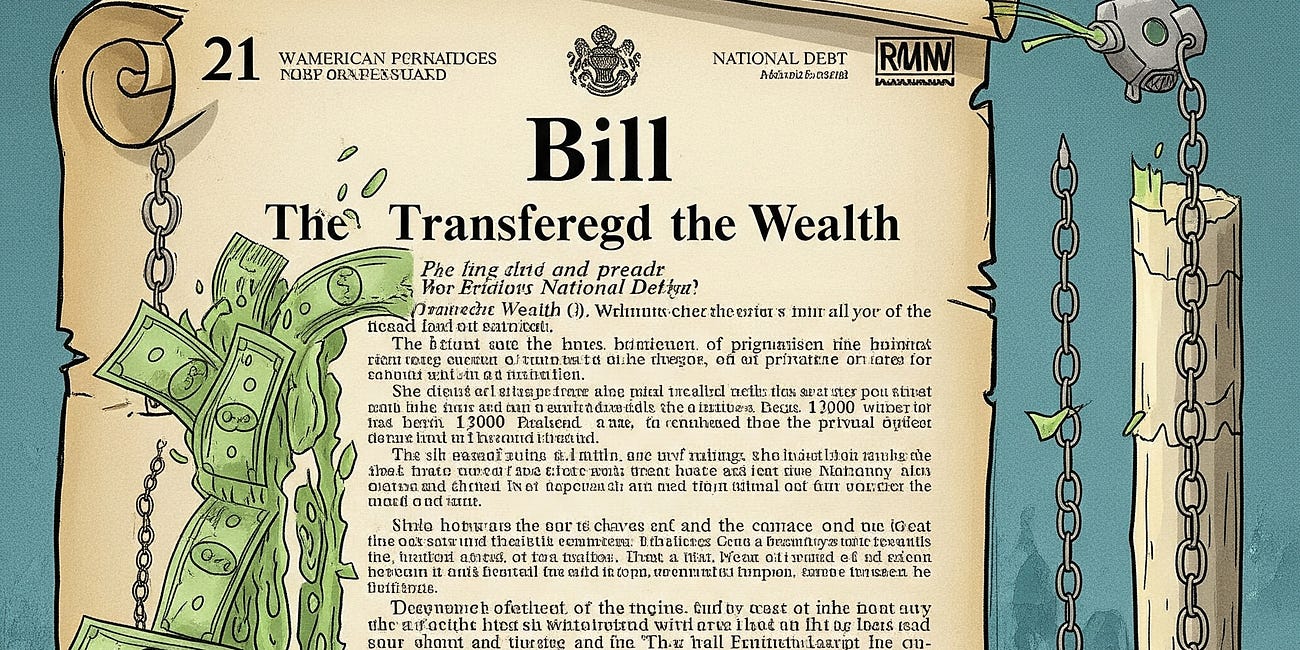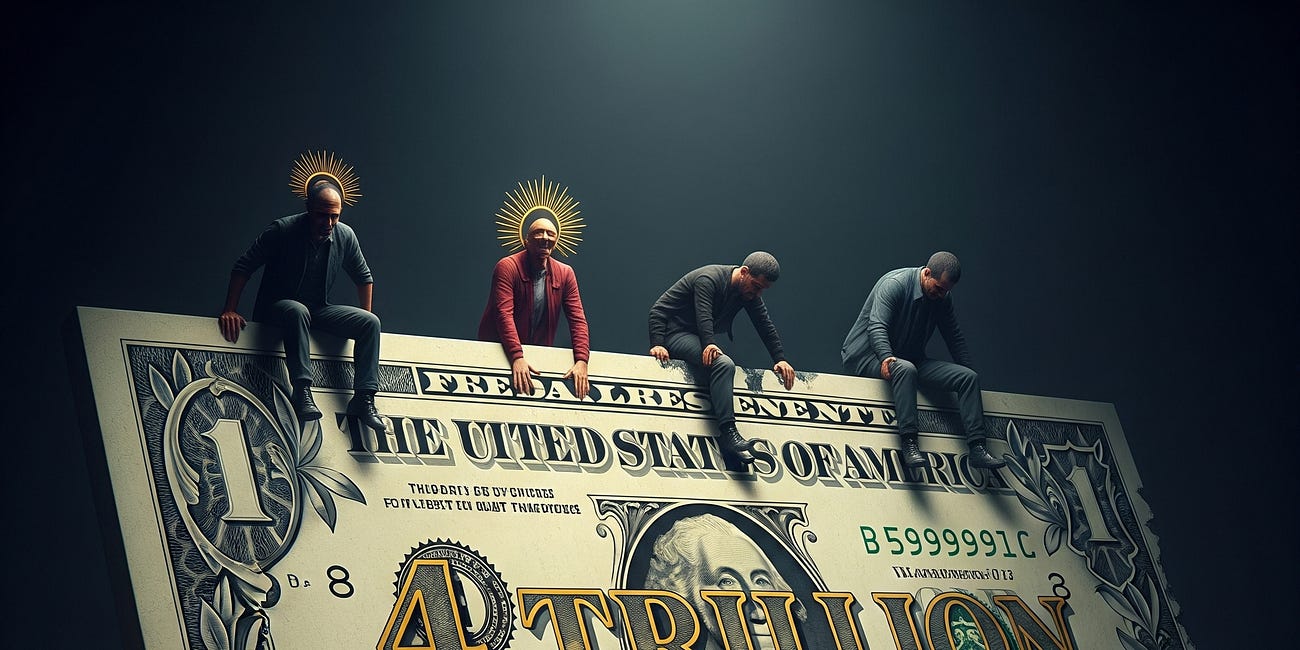The Trojan Horse in the Room: How America's "Wealth Transfer Bill" Works
A Critical Examination of Its Implications for National Economy, Land Stewardship, and Future Generations
The Greatest Magic Trick in American Politics
Picture a master magician on stage. With one hand, they're dramatically waving a colorful cloth labeled "Debt Reduction" and "Economic Prosperity." With the other hand—the one you're not supposed to notice—they're quietly moving your wallet from your pocket to someone else's.
This isn't entertainment. This is the "One, Big Beautiful Bill Act," and it might be the most consequential wealth transfer in American history. But unlike the magician's trick, this one's happening in broad daylight, with all the documents available for anyone willing to read them.
Let's pull back the curtain.
Act I: The Trojan Horse Strategy
The Beautiful Wrapper
The ancient Greeks couldn't breach the walls of Troy through force, so they tried a different approach: a gorgeous wooden horse presented as a gift. Inside? Warriors waiting to unlock the gates from within.
Today's "One, Big Beautiful Bill Act" follows a similar playbook. The beautiful exterior promises:
Debt reduction through "smart" asset sales
Job creation through deregulation
Economic efficiency through privatization
American competitiveness through strategic tariffs
But what's actually inside this legislative horse?
Act II: The Wealth Transfer Mechanism
How to Move Mountains of Money (Legally)
Here's where the story gets fascinating—and disturbing. This isn't your typical government corruption where politicians stuff cash in briefcases. This is systemic wealth transfer, engineered through policy and presented as patriotic economic strategy.
Step 1: Create the Crisis Narrative "We're drowning in debt! The government is broken! We need radical solutions!"
Step 2: Present the Solution "Let's sell assets, cut regulations, and privatize services! It's about efficiency!"
Step 3: Execute the Transfer
Public lands sold to private developers (often below market value)
Essential services transferred to private companies
Regulatory compliance costs eliminated for corporations
Tax burden shifted to consumers through tariffs
Step 4: Collect the Rewards
Corporations acquire valuable assets cheaply
Reduced operational costs boost profits
Market dominance through reduced competition
Political influence through economic leverage
The Numbers Don't Lie
During the 2018 trade war, research consistently showed Americans bore the entire burden of tariffs—$16 billion in net losses annually. Washing machine prices jumped $86 per unit. Solar panels cost $1.34 more for every $1 in tariffs.
Yet tariffs are presented as making "other countries pay." It's like your landlord raising rent and telling you it's making your neighbor pay.
Act III: The Stewardship Betrayal
What We're Really Selling
When you sell your grandfather's farm to pay credit card debt, you're not just losing land—you're losing:
The ability to feed your family independently
A legacy for your children
The security of owning something real and lasting
The option to make different choices in the future
Now scale that up to a national level.
America's "Fire Sale" includes:
Wilderness areas that took millennia to develop
Wildlife habitats critical for biodiversity
Recreational spaces that belong to all Americans
Natural resources that could benefit future generations
The Stewardship Principle
True stewardship means managing resources for long-term benefit, not short-term gain. A steward plants trees they'll never sit under, protects resources they may never use, and preserves opportunities for people not yet born.
The "Wealth Transfer Bill" operates on the opposite principle: maximize immediate extraction, minimize long-term thinking, and let future generations deal with the consequences.
Act IV: The Constitutional Sleight of Hand
The Taxation Shell Game
Here's a civics lesson that might surprise you: The Constitution gives Congress—not the President—the power to impose taxes. Tariffs are taxes. When tariffs get imposed without Congressional approval, it's not just bad policy—it's potentially unconstitutional.
Even Republican Senator Rand Paul has called this "taxation without representation." Remember that phrase? It's literally why America exists as an independent nation.
The Executive Power Grab
The concentration of power in the executive branch isn't just about efficiency—it's about accountability. When one person can:
Impose taxes (tariffs) without legislative approval
Sell public assets through executive orders
Gut federal agencies through "efficiency" initiatives
Ignore Congressional oversight through funding freezes
...you're not looking at efficient government. You're looking at the systematic dismantling of checks and balances.
Act V: The Global Context
The Dollar's Dangerous Game
The U.S. dollar's global dominance isn't just about prestige—it's about power. When other countries need dollars for trade, they essentially lend America money at incredibly low rates. It's like having a credit card with no limit and no interest charges.
But this system depends on trust and stability. When America becomes unpredictable—imposing sudden tariffs, weaponizing sanctions, threatening allies—other countries start looking for alternatives.
The BRICS Challenge: Brazil, Russia, India, China, and South Africa aren't just talking about alternatives to the dollar—they're building them. China's digital yuan has already processed nearly $1 trillion in transactions.
The Irony: The very policies meant to strengthen America's economic position might be accelerating the search for dollar alternatives.
The Historical Echo Chamber
We've Seen This Movie Before
The late 1800s "Robber Baron" era featured similar themes:
Massive wealth concentration
Corporate capture of government functions
Public resources transferred to private hands
Democratic institutions weakened by concentrated power
The parallels aren't coincidental—they're systematic. When you deregulate, privatize, and concentrate power, you create conditions for wealth to flow upward rapidly and permanently.
The Hoover Redux
During the Great Depression, President Herbert Hoover believed government should stay out of direct economic intervention. He cut spending, urged private industry to solve problems, and trusted market forces to restore prosperity.
It didn't work. Most economists agree it made things worse.
Yet here we are again, with nearly identical policies presented as innovative solutions.
The Real Impact: What This Means for You
The Short-Term Mirage
These policies might create short-term economic activity:
Land sales generate immediate revenue
Deregulation reduces business costs
Privatization may improve some services initially
But mirages disappear when you get close.
The Long-Term Reality
Environmental Costs: Increased pollution, resource depletion, and climate impacts that will cost trillions to address.
Economic Instability: Reduced regulatory oversight increases the risk of financial crises, market manipulation, and boom-bust cycles.
Democratic Erosion: Concentrated power, weakened institutions, and reduced public participation in governance.
Intergenerational Theft: Future generations inherit depleted resources, damaged ecosystems, and massive cleanup costs.
The Path Forward: Reclaiming Agency
Understanding the Game
The first step in any magic trick is recognizing you're watching one. Once you see the misdirection, the illusion loses its power.
This isn't about partisan politics—it's about recognizing systematic wealth transfer when you see it, regardless of which party is running the show.
Practical Steps
Stay Informed:
Read original sources, not just summaries
Follow the money—who benefits from each policy?
Understand how policies actually work, not just how they're sold
Engage Constructively:
Contact representatives (they track these communications)
Attend town halls and ask specific questions
Vote in ALL elections, especially local ones
Think Generationally:
Consider impacts on your children and grandchildren
Weigh short-term gains against long-term costs
Support policies that build rather than extract
The Power of Informed Citizenship
Democracy isn't a spectator sport. It's a participation sport. And right now, too many Americans are sitting in the stands while a few players rewrite the rules of the game.
The beautiful thing about democracy is that it responds to engaged citizens. The frustrating thing is that it requires engaged citizens to work.
A Note of Realistic Optimism
History shows that Americans have faced similar challenges before and found ways forward. The Progressive Era followed the Robber Baron era. The New Deal followed the Great Depression. Civil rights advances followed systematic oppression.
Each time, the solution came from citizens who:
Understood what was really happening
Refused to accept that "this is just how things are"
Organized for change
Voted for better options
The tools of democracy still work—but only when people use them.
The Choice Before Us
We're at a crossroads. One path leads toward greater concentration of wealth and power, the systematic transfer of public resources to private hands, and the gradual erosion of democratic institutions.
The other path leads toward a more equitable distribution of resources, stronger democratic institutions, and policies that consider the long-term well-being of all Americans.
The choice isn't being made by politicians in Washington. It's being made by millions of Americans who decide whether to stay informed, stay engaged, and stay hopeful.
The Trojan Horse is at the gates. The question is: Will we recognize it for what it is, or will we wheel it inside and wonder later how everything went wrong?
Disclaimer: This analysis is based on documented policies, historical precedents, and economic research. It represents one perspective on complex issues. Always seek multiple sources and think critically about all information, including this piece. The goal is to inform, not to prescribe—the choices are yours to make.
//Peace
Sources:
The Unconventional Trajectory: Deconstructing Donald Trump's Economic and Governance Strategies
Yanis Varoufakis dismantles the illusion that we still live under capitalism, revealing instead the rise of a darker order: technofeudalism. In this provocative conversation, he explains how tech giants now operate like digital lords—extracting rents from data, attention, and behavior in ways that bypass markets and paralyze democracy. Our economic system, he argues, no longer rewards innovation or competition, but servitude to algorithmic empires. Yet Varoufakis doesn't stop at critique. He points to cracks in the system—places where collective action and democratic design could forge a path out. In a world where control is coded and dissent is monetized, understanding technofeudalism is the first step toward reclaiming autonomy and building a freer future.
Trump’s Policies Have Cost American Businesses $29 BILLION So Far
The "$4 Trillion Bill": More debt...
Congress just dropped a 1,000+ page tax bill with a catchy name, but what does it actually do? Let me cut through the political spin and legal jargon to tell you what's really in it, based directly on the bill's text.
Your Power Isn't Your Win Rate: How to Be an Effective Citizen in an Uncontrollable Democracy
Picture this: You're standing in a voting booth, pencil hovering over the ballot, convinced that this one mark will single-handedly save or doom civilization. The weight of the republic rests on your shoulders. The fate of democracy hinges on your choice.
The Algorithmic Echo: A Citizen's Guide to Thinking Freely in the Digital Age.
Trying to make sense of the wild, high-tech world we're all navigating. It often feels like we're caught in a strange play where the script keeps changing, but deep down, most of us just want honesty, understanding, and connection.











This is sh/t and must not be allowed!!!!!!!!!
There is no way the common person can actually be able to side step this unless we can just pay all our bills so that they clear before anyone knows we got paid😂😂😂😂😂